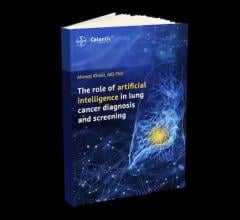
July 9, 2019 — New Cleveland Clinic-led research shows that artificial intelligence (AI) can use medical scans and health records to personalize the dose of radiation therapy used to treat cancer patients.
Published in The Lancet Digital Health, the research team developed an AI framework based on patient computerized tomography (CT) scans and electronic health records. This new AI framework is the first to use medical scans to inform radiation dosage, moving the field forward from using generic dose prescriptions to more individualized treatments.
Currently, radiation therapy is delivered uniformly. The dose delivered does not reflect differences in individual tumor characteristics or patient-specific factors that may affect treatment success. The AI framework begins to account for this variability and provides individualized radiation doses that can reduce the treatment failure probability to less than 5 percent.
“While highly effective in many clinical settings, radiotherapy can greatly benefit from dose optimization capabilities,” said lead author Mohamed Abazeed, M.D., Ph.D., a radiation oncologist at Cleveland Clinic’s Taussig Cancer Institute and a researcher at the Lerner Research Institute. “This framework will help physicians develop data-driven, personalized dosage schedules that can maximize the likelihood of treatment success and mitigate radiation side effects for patients.”
The framework was built using CT scans and the electronic health records of 944 lung cancer patients treated with high-dose radiation. Pre-treatment scans were input into a deep learning model, which analyzed the scans to create an image signature that predicts treatment outcomes. Using sophisticated mathematical modeling, this image signature was combined with data from patient health records – which describe clinical risk factors – to generate a personalized radiation dose.
“The development and validation of this image-based, deep-learning framework is exciting because not only is it the first to use medical images to inform radiation dose prescriptions, but it also has the potential to directly impact patient care,” said Abazeed. “The framework can ultimately be used to deliver radiation therapy tailored to individual patients in everyday clinical practices.”
There are several other factors that set this first-of-its-kind framework apart from other similar clinical machine learning algorithms and approaches. The technology developed by the team uses an artificial neural network that merges classical approaches of machine learning with the power of a modern neural network. The network determines how much prior knowledge to use to guide predictions about treatment failure. The extent that prior knowledge informs the model is tunable by the network. This hybrid approach is ideal for clinical applications since most clinical datasets in individual hospitals are more modest in sample size compared to non-clinical datasets used to make other well-known AI predictions (i.e. online shopping or ride-sharing).
Additionally, this framework was built using one of the largest datasets for patients receiving lung radiotherapy, rendering greater accuracy and limiting false findings. Lastly, each clinical center can utilize their own CT datasets to customize the framework and tailor it to their specific patient population.
“Machine learning tools, including deep learning, are poised to play an important role in healthcare,” said Abazeed. “This image-based information platform can provide the ability to individualize multiple cancer therapies but more immediately is a leap forward in radiation precision medicine.”
This study, which was done in collaboration with Siemens Healthcare, was funded by a National Institutes of Health grant to Abazeed, the National Cancer Institute, American Lung Association, Siemens Healthcare and VeloSano (Cleveland Clinic’s flagship philanthropic initiative) to advance cancer research.
Watch the VIDEO: Radiation Versus Surgery for Non-Small Cell Lung Cancer
For more information: www.thelancet.com/digital-health
Reference
1. Lou B., Doken S., Zhuang T., et al. An image-based deep learning framework for individualising radiotherapy dose: a retrospective analysis of outcome prediction. The Lancet Digital Health, July 2019. https://doi.org/10.1016/S2589-7500(19)30058-5


 September 12, 2024
September 12, 2024 







